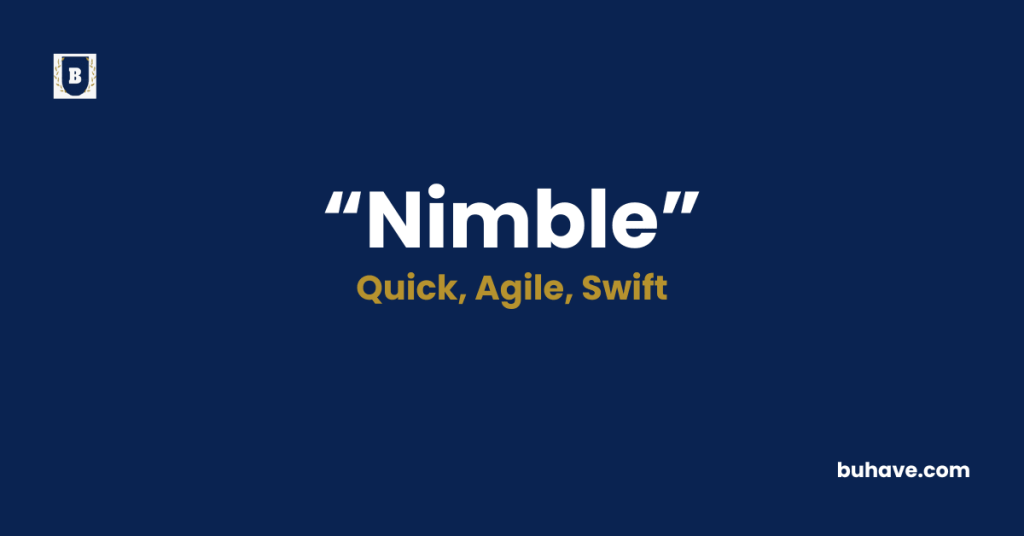The word ‘Nimble’ (Adjective) describes someone or something that moves quickly, lightly, and easily, often with mental sharpness or physical grace. In this guide, you’ll learn the full definition, synonyms, antonyms, etymology, and real-life examples of how to use ‘Nimble’ correctly in sentences.
Nimble Explained in Depth
A complete and detailed guide to the word Nimble including meaning, definition, examples, etymology, synonyms, and antonyms.
Meanings of Nimble
The word nimble refers to the ability to move quickly, lightly, and easily, whether physically or mentally. It’s often used to describe someone who is graceful, quick-footed, and agile—like a dancer, an athlete, or even a child at play. However, nimbleness isn’t only about the body. It also applies to the mind. Someone with a nimble mind can think quickly, adapt fast, and respond with cleverness or creativity in changing situations.
In everyday speech, we might describe a squirrel as nimble for darting through trees or a comedian as nimble-minded for their quick, witty remarks. It suggests an alert, responsive, and flexible nature. Whether on your feet or in thought, being nimble means you can react swiftly and skillfully. People often admire nimbleness because it reflects a special combination of speed, control, and intelligence that helps someone navigate challenges with ease.
Definition
Nimble means quick and light in movement or action, and by extension, quick-witted or mentally alert. It describes a person or thing that is agile, responsive, and able to adapt or react quickly with skill and grace.
For example, a nimble gymnast flips through the air with effortless control. A nimble software developer adapts to new coding languages and solves bugs quickly. A nimble thinker comes up with creative solutions in real time. The word embodies motion, sharpness, and ease—making it a compliment for both physical and mental agility. In every context, it conveys an image of someone or something smoothly navigating challenges or changes with finesse and precision.
Etymology
The word “nimble” has its roots in Middle English, where it was originally spelled “nimbel.” It developed from the Old English word næmel, which meant “quick to grasp” or “capable of quick taking.” That term itself stems from the root verb niman, meaning “to take” or “to seize.”
The connection here is clear: someone who is nimble is someone who can “seize” an opportunity or “grasp” an idea quickly—both physically and mentally. Over time, the word broadened to include both bodily dexterity and mental sharpness.
This dual focus is reflected in historical usage as well. In literature and daily conversation from the 1500s onward, “nimble” often described not only movement but also wit and adaptability. The shift from a purely physical meaning to include intellectual agility makes “nimble” especially versatile in modern English. It shows how language evolves to mirror human appreciation for sharpness in both body and mind.
Example Sentences
- The dancer’s nimble steps impressed the audience with their speed and grace.
- Her nimble fingers flew across the piano keys during the recital.
- He gave a nimble response during the debate, catching his opponent off guard.
- The nimble squirrel leapt from branch to branch effortlessly.
- In today’s fast-changing tech world, nimble companies adapt quickly and thrive.
Nimble Synonyms
- Agile
- Quick
- Light-footed
- Graceful
- Alert
- Swift
- Flexible
- Spry
- Sharp
- Clever
Nimble Antonyms
- Clumsy
- Slow
- Stiff
- Awkward
- Sluggish
- Dull
- Inflexible
- Heavy-footed
- Uncoordinated
- Unresponsive
FAQs about Nimble
Here are some frequently asked questions (FAQs) about the word “Nimble”
1. What does “nimble” mean in simple terms?
It means being quick and light in movement or quick to understand and respond—physically or mentally.
2. Can “nimble” describe someone’s mind?
Yes, “nimble-minded” is often used to describe someone who thinks fast, adapts easily, and responds cleverly.
3. Is “nimble” a compliment?
Definitely. Calling someone nimble usually means they are capable, quick, and skillful—physically or intellectually.
4. What’s the difference between “nimble” and “agile”?
While both mean quick and flexible, “nimble” often suggests lightness and mental alertness, whereas “agile” leans more on physical flexibility and speed.
5. Can you use “nimble” in a business or tech setting?
Yes, in business, a nimble company or team is one that responds quickly and efficiently to changes or challenges.
6. Is “nimble” used to describe animals?
Yes, animals like cats, squirrels, or monkeys are often described as nimble due to their light, fast movements.
7. What are some common phrases with “nimble”?
Phrases include “nimble fingers,” “nimble mind,” “nimble on your feet,” and “stay nimble.”
Explore more N words:
Positive words that start with N
Negative words that start with N
Adjectives words that start with N
Nouns that start with N
Verbs that start with N

















